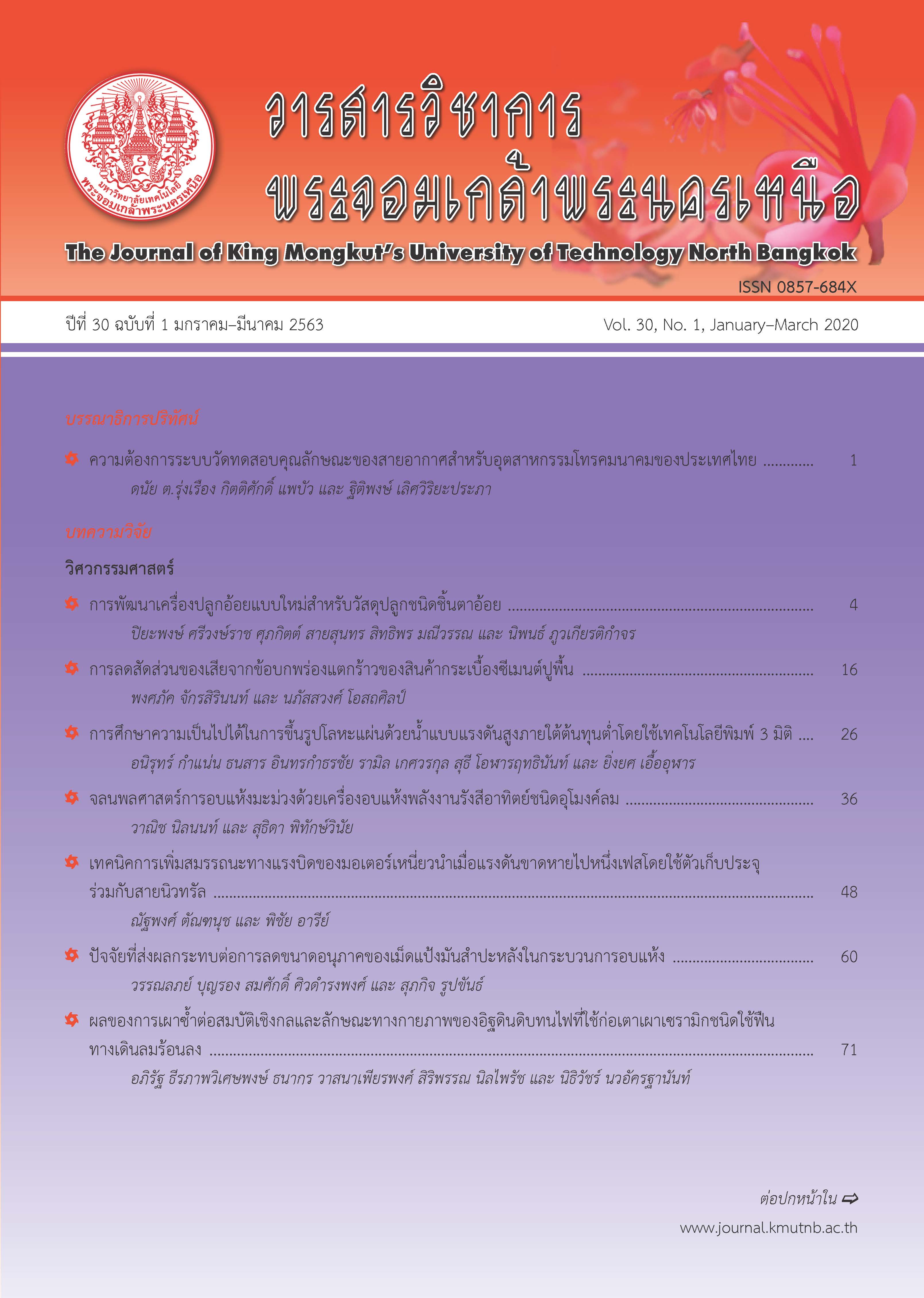การพัฒนาเครื่องปลูกอ้อยแบบใหม่สำหรับวัสดุปลูกชนิดชิ้นตาอ้อย
Main Article Content
บทคัดย่อ
งานวิจัยนี้มีวัตถุประสงค์เพื่อพัฒนาเครื่องปลูกอ้อยแบบใหม่ที่ใช้ชิ้นตาอ้อยเป็นวัสดุปลูกและวิเคราะห์เศรษฐศาสตร์วิศวกรรมเครื่องปลูกอ้อยฯ ที่พัฒนาขึ้น เครื่องต้นแบบที่พัฒนาใช้งานร่วมกับรถแทรกเตอร์ขนาด 30 แรงม้า และเป็นเครื่องปลูกอ้อยแบบร่องเดี่ยว ส่วนประกอบที่สำคัญของเครื่องประกอบด้วย อุปกรณ์เปิดร่อง ท่อนำวัสดุปลูก โครงสร้างเครื่องชุดกะพ้อลำเลียง ถังบรรจุวัสดุปลูก ถังบรรจุปุ๋ย อุปกรณ์โรยปุ๋ย ชุดจานกลบดินและล้ออัดดิน โดยก่อนการใช้งานเครื่องปลูกอ้อยฯจำเป็นจะต้องมีการเตรียมชิ้นตาอ้อยก่อนด้วยการใช้เครื่องตัดชิ้นตาอ้อย จากนั้นนำชิ้นตาอ้อยบรรจุใส่เครื่องปลูกอ้อยฯ เพื่อทำการปลูก จากการทดสอบเครื่องปลูกอ้อยฯ ด้วยการเลือกใช้ความเร็วเคลื่อนที่ของเครื่องปลูกอ้อยฯ แตกต่างกัน 4 ระดับพบว่าเครื่องปลูกอ้อยฯ เคลื่อนที่และทำงานได้อย่างเหมาะสมที่ความเร็วเคลื่อนที่ที่ระดับเกียร์ต่ำ 3 (3L) ของรถแทรกเตอร์โดยที่ระดับเกียร์ดังกล่าวทำให้เครื่องปลูกอ้อยฯ มีค่าความสามารถเชิงไร่ทางทฤษฎีเท่ากับ 1.89 ไร่ต่อชั่วโมง ค่าความสามารถเชิงไร่จริงเท่ากับ 1.25 ไร่ต่อชั่วโมง และประสิทธิภาพการทำงานเท่ากับ 66% สำหรับผลการวิเคราะห์ค่าทางเศรษฐศาสตร์วิศวกรรมชี้ให้เห็นว่าต้นทุนในการใช้งานเครื่องปลูกอ้อยฯ มีค่าเท่ากับ 192.9 บาทต่อชั่วโมง จุดคุ้มทุนมีค่าเท่ากับ 92.04 ไร่ต่อปี และระยะเวลาคืนทุนมีค่าเท่ากับ 0.82 ปี
Article Details
บทความที่ลงตีพิมพ์เป็นข้อคิดเห็นของผู้เขียนเท่านั้น
ผู้เขียนจะต้องเป็นผู้รับผิดชอบต่อผลทางกฎหมายใดๆ ที่อาจเกิดขึ้นจากบทความนั้น
เอกสารอ้างอิง
[2] Foreign Agricultural Service. (2019, May). Sugar: World markets and trade. Department of Agriculture, United States [Online]. Available: https://apps.fas.usda.gov/psdonline/circulars/sugar.pdf
[3] Office of the Cane and Sugar Board. Sustainable Sugarcane field management. Office of the Cane and Sugar Board. Bangkok, Thailand [Online]. Available: https://www.ocsb.go.th/upload/journal/fileupload/144-4003.pdf
[4] B. S. Bahaloyodhin and S. Leeyavatananupong, “Development of sugarcane planter in Thailand,” KU Engineering Journal, vol. 5, pp. 136–135, 1988 (in Thai).
[5] B. Saitthiti, Tropical Farm Machinery. Bangkok: Department of Farm Mechanics, Faculty of Agriculture, Kasetsart University 2010 (in Thai).
[6] A. Patil, A. K. Dave, and R. N. S. Yadav, “Evaluation of sugarcane cutter planter,” Sugar Tech, vol. 6, no. 3, pp. 121–125, 2004.
[7] B. Tangwongkit, P. Piya-anat, and R. Tangwongkit, “Development of a sugarcane planter for soil and water conservation,” in Proceedings Kasetsart Conference 53th, 1997, pp. 516–523.
[8] A. M. Compagnon, C. E. A Furlani, R. P. Silva, M. T. Cassia, and F. H. Arriel, “Billet metering mechanism of a sugarcane planter,” African Journal of Agricultural Research, vol. 11, no. 38, pp. 3643–3650, 2016.
[9] K. Saengprachatanarug, C. Chaloemthoi, K. Kamwilaisak, P. Kasemsiri, S. C. Udom, and E. Taira, “Effect of metering device arrangement to discharge consistency of sugarcane billet planter,” Engineering in Agriculture, vol. 11, no. 3, pp. 139–144, 2018.
[10] K. Thammasiri, “Comparison of growth, yield, and yield components of three sugarcane varieties grown from bud chips and three-budded setts,” M.S. thesis, Department of Agronomy, Faculty of Agriculture, Kasetsart University, Bangkok, 1981 (in Thai).
[11] R. Jain, S. Solomon, A. K. Shrivastava, and A. Chandra, “Sugarcane bud chips: A promising seed material,” Sugar Tech, vol. 12, no. 1, pp. 67–69, 2010.
[12] Department of Agriculture Extension. (2013, August). Technique operation and maintenance in farm equipment. Ministry of Agriculture and Cooperatives. Bangkok, Thailand [Online]. Available: https://www.servicelink.doae.go.th/webpage/book_%2024%20guide/17.pdf
[13] RNAM Test Code & Procedures for Farm Machinery, Technical Series No. 12, 1983.
[14] P. Sriwongras, S. Intaravichai, and T. Kiatiwat, “Economic analysis of community level small rice mill,” The Journal of KMUTNB, vol. 29, no.2, pp. 237–246, 2019 (in Thai).
[15] S. Kumar, M. Singh, and B. R. Singh, “Feasibility and economic viability of raised bed planter in western plane zone of Uttar Pradesh, India,” Soil and Tillage Research, vol. 128, pp. 37–43, 2013.
[16] T. Thienyaem, K. Saengprachatanarug, N. Weerakulwattana, and S. Anutarapongpan, “Study of performance comparison between sugarcane billet planter and convection sugarcane planter in Khon Kaen province,” in Proceedings The 14th TSAE International Conference, 2013, pp. 259–261.
[17] D.N. Sharma and S. Mukesh, Farm Machinery Design, 2nd ed. India: Jain Brothers, 2010.
[18] C. Kusoncum and K. Sethanan, “A study of costs and returns of sugarcane production sent to the sugar mill for small-scale growers in Buakhao, Kuchinarai district, Kalasin province,” in Proceedings IE Network Conference, Phetchaburi Province, 2012, pp. 2134–2140.
[19] P. Manivong and E. Bourgois. (2017, February). Thai Sugarcane Sector and Sustainability. FairAgora Asia Co., Ltd. Bangkok, Thailand [Online]. Available: https://www.bonsucro.com/wp-content/uploads/2017/08/Thai-White-Paper-FINAL-LowRes.docx.pdf

